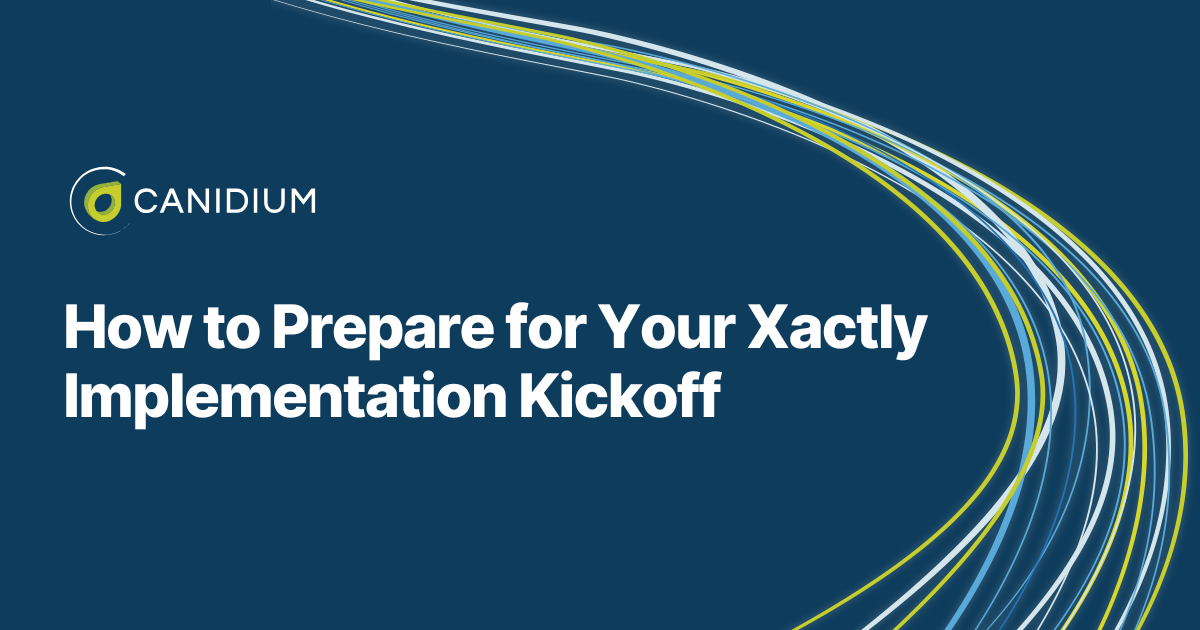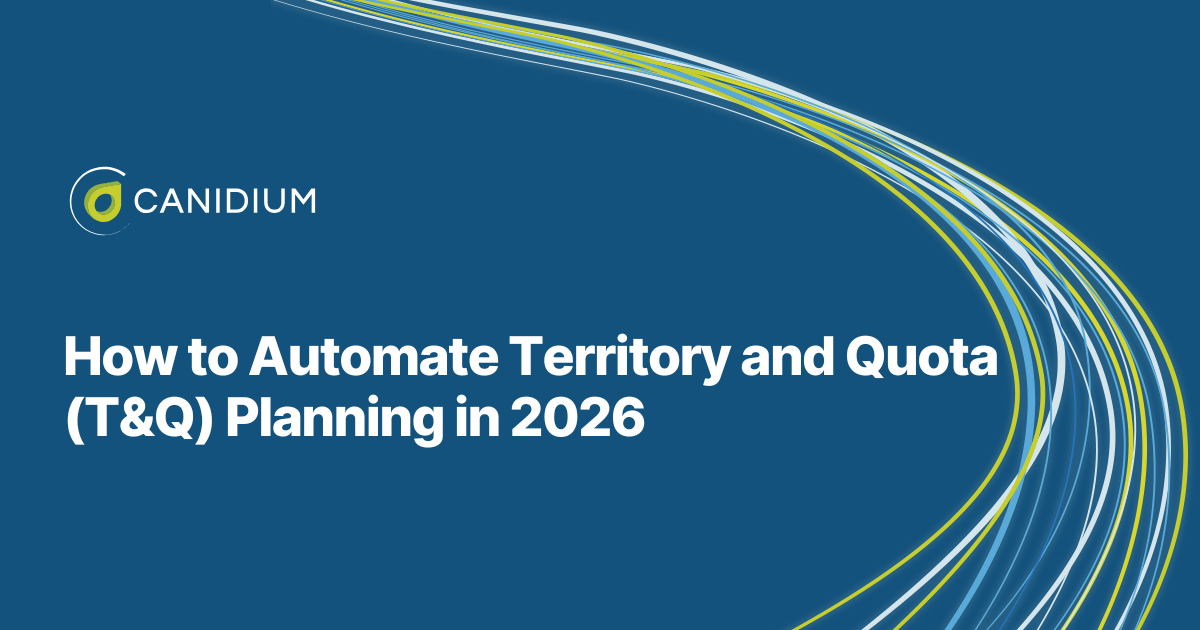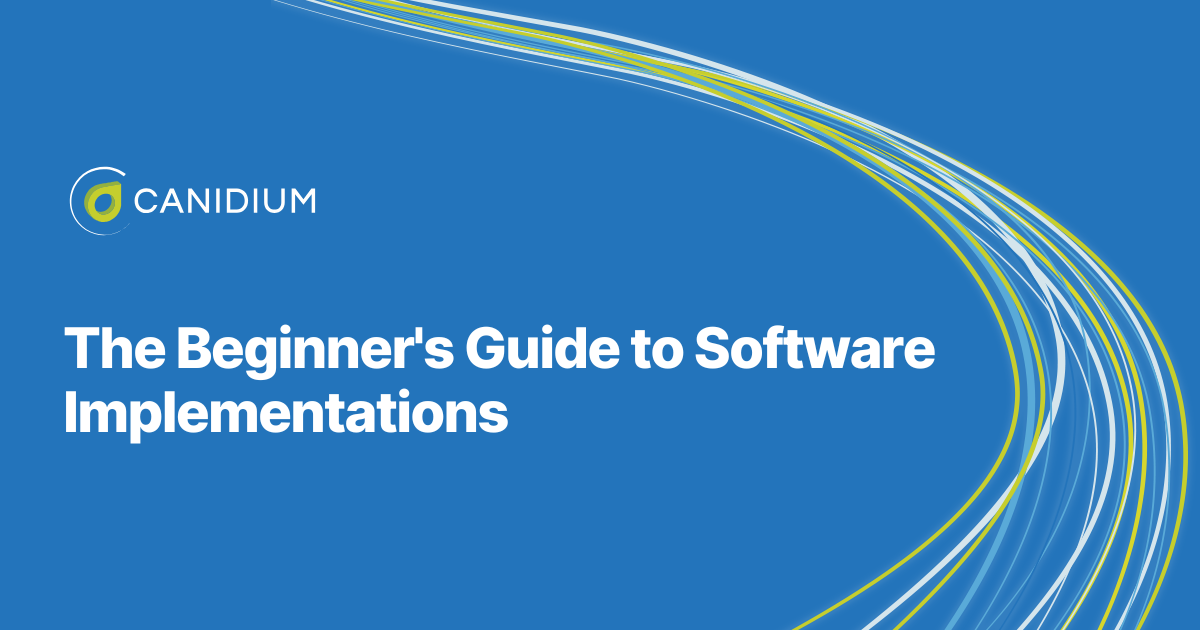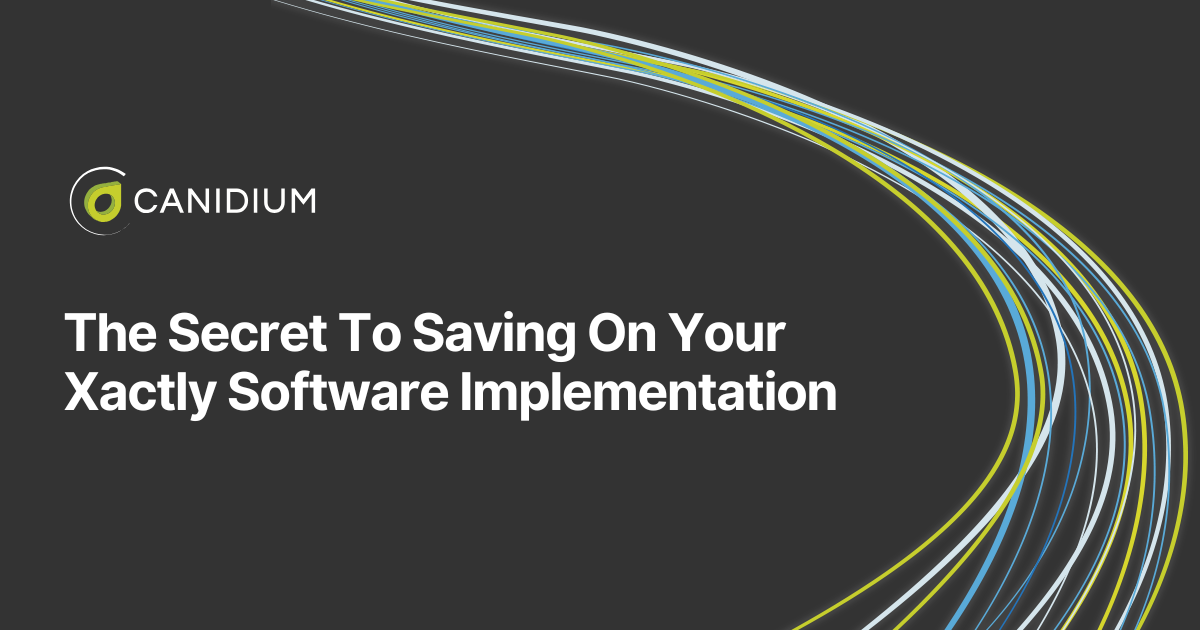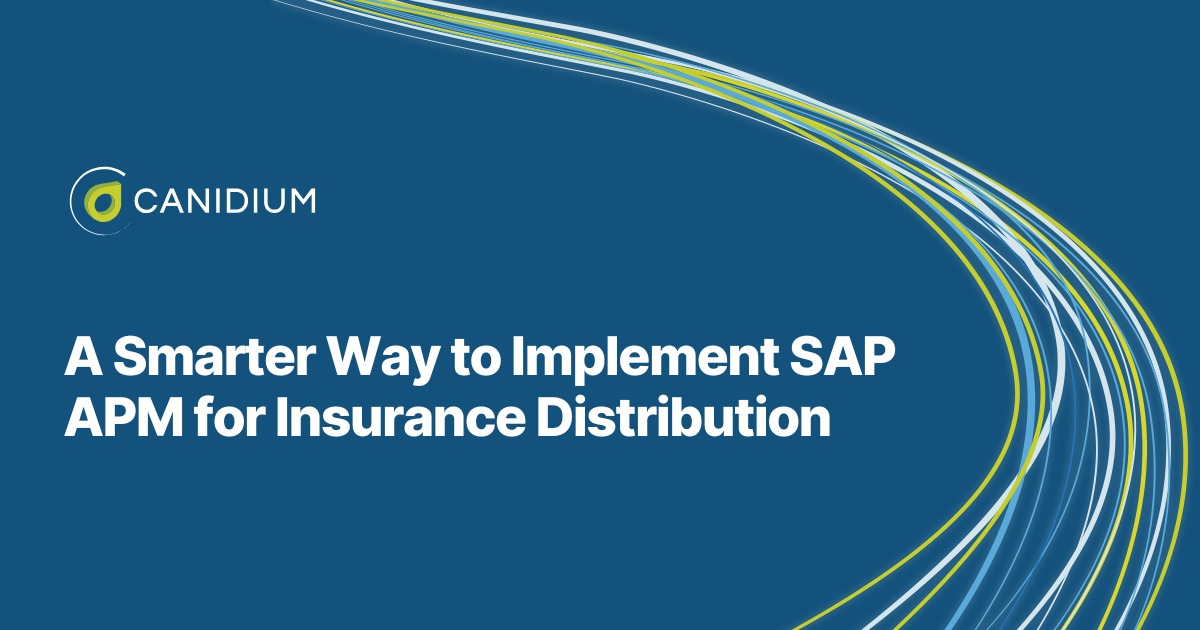Your project’s kickoff meeting will set the tone for the rest of your Xactly implementation. It’s a critical juncture in the initiation of the technical design and configuration of your incentive compensation management solution. These meetings are all about gathering the information your implementation team needs to attune your system to your requirements. At the same time, it’s your chance to communicate the value of your new solution to your internal stakeholders.
Nailing your kickoff meeting gets you on the right track. So, our Xactly implementation team put together this guide. We will cover everything you need to prepare ahead of time, as well as what to expect during kickoff week. Here’s how to make the most of them and feel confident about the process.
The Purpose of Kickoff Meetings
Think of these meetings as the blueprint for your project. Just as a blueprint provides a detailed plan for building a structure, kickoff meetings lay out the framework for your project’s success. The main goal is to dive deeply into the details of your compensation plans and the data that powers them, ensuring every aspect is accounted for. This is your chance to identify potential challenges, clarify objectives, and set expectations. By the end of these conversations, you and your team will have a clear, actionable path forward.
Preparation is key. When you arrive with all relevant documents, examples, and a willingness to collaborate, it’s much easier to align with your implementation team. Together, you’ll tackle specific details, troubleshoot potential roadblocks, and develop solutions that fit your unique needs. These meetings are not just about collecting information—they’re about building a partnership that drives results and ensures the project meets your business goals.
Download this quick guide to preparing for your planning call.
How to Prepare for Kickoff
Proper preparation is essential to ensuring a successful kickoff. You should begin prepping for your project before your initial planning call. Here’s how:
What to Do Before the Planning Call
It begins with thoughtful planning before the initial call. Start by identifying the key participants who will drive the project forward. Typically, this includes your Project Manager (PM) and any internal sponsors who can provide critical input. Next, establish your internal project team early, defining roles and responsibilities to ensure that everyone knows their part. Before the kickoff week, clear time on your team’s schedules for workshops, including one hour each for data and compensation workshops, as well as six hours during the kickoff week for in-depth collaboration.
Between the Planning Call and the Kickoff Meeting
The data and compensation workshops will occur after the planning call to help you prepare for kickoff week. Before your workshops, finalize your compensation plans and gather all required data inputs. Having these materials ready ensures that discussions are focused and productive. Also, collect and organize all relevant documents, examples, and compensation plans to share with the implementation team. This step is crucial for identifying potential gaps and addressing them ahead of time. Similarly, coordinate team schedules to guarantee full participation during workshops and kickoff activities.
Kickoff Week
In the lead-up to kickoff week, ensure deliverables are finalized by incorporating feedback from earlier workshops. Address any data gaps identified and ensure your team’s roles and responsibilities are clearly defined for the kickoff and subsequent project phases. Simultaneously, reviewing workshop outputs is equally important. Document decisions and action items from these sessions to create a clear and actionable kickoff agenda. Use this time to align project goals with your implementation partner, addressing any remaining questions about timelines or deliverables. Finally, communicate these plans and schedules with your internal stakeholders, ensuring everyone is aligned and prepared to contribute.
Understand Xactly Incent: From Data to Payouts
Understanding how Xactly Incent processes data to produce payouts is a fundamental part of the implementation process. By visualizing this journey, you gain a clear picture of how each step connects and impacts the final outcome. Here’s how it works: your sales data flows seamlessly into Xactly Incent, which then processes this information by applying your unique commission rules to calculate payouts. Finally, the system ensures accurate and efficient payments to your team members.

Knowing this process is essential because it highlights the critical points where your input is needed. For example, you’ll need to provide details on how sales data is structured, what fields are essential for calculations, and how commission rules should be applied. These decisions directly influence how the system is configured and how well it aligns with your organization’s goals.
Additionally, this understanding helps you identify potential gaps or inefficiencies early on. If a specific data field isn’t aligned with your payout rules or if discrepancies arise in the data flow, these issues can be addressed proactively.
Real-Life Example: Setting Up a Commission Plan
Your software implementation team will need input on your desired commission plans. Here’s a quick snapshot of how a commission plan might look in action. Use this guide to examine what kind of commission structures you need.
ABC Corp Scenario:
- Three commission plans: “AE,” “AE Manager,” and “SA” for 2024.
- Components include “Bookings ACV,” “Bookings ACV Multi-Year,” and “Renewals ACV.”
Example Breakdown:
- Bookings ACV: Monthly commissions calculated based on a tiered rate table:
- Tier 1 (0-100% attainment): 2.5%
- Tier 2 (100-150% attainment): 5.0%
- Tier 3 (150%+ attainment): 3.5%
In Your Kickoff: Expect discussions about:
- Identifying which orders qualify for commissions.
- Confirming how credits roll up through hierarchies.
- Validating calculations and tier percentages.
The Kickoff Week Conversations You Can Expect
Kickoff week is where the implementation process truly begins to take shape. These conversations are critical to building a system tailored to your organization’s needs, and they provide an opportunity to clarify requirements, align expectations, and establish a strong foundation for your project. Understanding what to expect during these discussions will ensure you’re prepared to engage effectively and contribute meaningfully.
For example, let’s imagine the conversation begins with defining how commission components like ‘Bookings ACV’ are identified. The implementation team might ask, "Can you explain how we identify orders eligible for ‘Bookings ACV’ commissions?" Your team’s response could clarify, "We use a Salesforce field called ‘Booking Type.’ Orders labeled ‘Renewal’ don’t qualify." This exchange helps the implementation team understand your data and ensures that the system correctly applies your business rules.
Another common topic might involve discussing sales order splits. The implementation team could ask, "Are splits allowed for orders with multiple sales reps?" To which your team might respond, "Yes, splits are captured in the ‘Opportunity Split’ table." These questions and answers create a shared understanding of how the system will manage complex scenarios, like assigning commissions to multiple contributors.
Why should you care about these details? These back-and-forth conversations are not just about data entry; they are about configuring a system that reflects your unique business processes and ensures accurate payouts. By providing clear and precise answers, you’re helping the implementation team avoid assumptions that could lead to errors or inefficiencies down the line.
Moreover, these discussions are a chance to validate the system’s design. For instance, the implementation team might summarize their understanding by saying, "Based on your explanation, we’ll configure the system to exclude ‘Renewal’ orders from ‘Bookings ACV’ commissions and to pull sales rep splits from the Opportunity Split table. Does that sound correct?" These moments of alignment ensure that both teams are working toward the same goal and that the system’s configuration meets your expectations.
Let’s Talk Data: Integration Insights
Data integration is a big focus during kickoff. Your team and the implementation team will work together to answer critical questions like:
- How do we uniquely identify sales orders?
- Which dates determine when commissions are calculated?
- How are sales reps assigned to orders?
For instance, you might agree to use ‘Opportunity ID’ as the unique identifier and ‘Closed Won Date’ to decide the month for commission calculations. Remember you will need to furnish documentation to your software implementation team to help them map out your integrations, so start gathering this information early on.
The Bigger Picture
While much of the focus during kickoff meetings is on the specifics of compensation plans and data integration, it’s equally important to address broader organizational and operational topics. These discussions help ensure that every possible scenario is considered, leaving no room for surprises later in the project.
One critical area is currency management. If your business operates across multiple countries or regions, understanding how exchange rates will be managed is vital. This includes determining the source of exchange rates, how often they’re updated, and how they’ll impact calculations and payouts. By addressing this upfront, you ensure that all transactions are accurately reflected in the appropriate currencies, minimizing the risk of miscalculations.
Another key topic is quotas. Adjustments for new hires, employees on leave, or those transitioning roles must be factored into the system. Discussing these nuances ensures that quotas remain fair and achievable, while also aligning with your organizational policies. For instance, will new hires receive prorated quotas, and how will temporary absences affect targets? These decisions shape how the system calculates and tracks performance.
Eligibility rules are also crucial. Your team will need to outline the conditions under which employees qualify for credits or commissions. This includes handling onboarding scenarios, where new hires might not yet meet certain criteria, and terminations, where the timeline for ceasing credits or payouts must be clarified. Addressing these rules early prevents any ambiguity that could lead to disputes or errors.
Plan details often require in-depth discussion as well. This might include handling complex scenarios like draws, guarantees, and mid-period plan transfers. For example, how will recoverable or non-recoverable draws be tracked? If an employee changes roles mid-quarter, how will their plan transfer be managed? These are the kinds of details that, when clarified upfront, pave the way for a system that adapts seamlessly to your business needs.
Tips to Get the Most Out of Kickoff
Preparation is key to making your kickoff a success. Here are some tips:
- Bring clear documentation of your commission plans and data sources.
- Involve stakeholders who can answer detailed questions.
- Share examples of your data fields to help illustrate your needs.
By coming prepared, you’ll make these meetings a productive, collaborative experience—laying the groundwork for a successful implementation.
Setting Yourself Up for a Successful Kickoff Week.
To set yourself up for a successful kickoff week, preparation is everything. Start by ensuring your team has a clear understanding of the project’s objectives and priorities. Assign roles and responsibilities so every participant knows their part in the process. Gather all necessary documentation, including compensation plans, data sources, and any relevant policies or guidelines. Having these materials on hand will streamline discussions and reduce delays.
Make sure your schedules are aligned. Kickoff week requires dedicated time from key team members, so blocking off calendars and coordinating availability in advance is crucial. Prepare to actively participate in conversations, as your insights and clarifications will be essential to tailoring the system to your unique needs. Additionally, review any preparatory materials provided by the implementation team to familiarize yourself with the agenda and discussion topics.
Finally, approach kickoff week with a collaborative mindset. This is your opportunity to build a strong foundation for the project and ensure alignment between your organization and the implementation team. By preparing thoroughly and engaging fully, you’ll pave the way for a smooth and successful implementation.
Don’t hesitate to contact your implementation team with any questions. In the meantime, learn more about the implementation process in this step-by-step guide.


